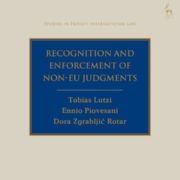Miss Anam Abdul-Majid (LLM, University of Birmingham; LLB, University of Nairobi; BSC.IBA, United States International University; Advocate and Head of Corporate and Commercial Department, KSM Advocates, Nairobi, Kenya).
Dr Chukwuma Okoli (Assistant Professor in Commercial Conflict of Laws at the University of Birmingham; Senior Research Associate; Private International Law in Emerging Countries, University of Johannesburg)
We would like to thank Joy Chebet, Law Student at Kenyatta University, for her research assistance and comments. We would also like to thank Professor Beligh Elbalti for his critical comments on the draft blogpost.
I. INTRODUCTION
Kenya is one of the countries that make up East Africa and is therefore part of the broader African region. As such, developments in Kenyan law are likely to have a profound impact on neighbouring countries and beyond, consequently warranting special attention.
In the recent case of Ingang’a & 6 others v James Finlay (Kenya) Limited (Petition 7 (E009) of 2021) [2023] KESC 22 (KLR), the Kenyan Supreme Court dismissed an appeal for the recognition and enforcement of a locus inspection order issued by a Scottish Court. The Kenyan Supreme Court held that ‘decisions by foreign courts and tribunals are not automatically recognized or enforceable in Kenya. They must be examined by the courts in Kenya for them to gain recognition and to be enforced’ [para 66]. In its final order, the Court recommended that in Kenya:
‘The Speakers of the National Assembly and the Senate, the Attorney-General, and the Kenya Law Reform Commission, attended with a signal of the utmost urgency, for any necessary amendments, formulation and enactment of statute law to give effect to this judgment and develop the legislation on judicial assistance in obtaining evidence for civil proceedings in foreign courts and tribunals.’
This Case is highly significant, because it extensively addresses the recognition and enforcement of foreign judgments in Kenya and the principles to be considered by the Kenyan Courts. It is therefore a Case that other African countries, common law jurisdictions, and further parts of the globe could find invaluable.
II. FACTS
The Case outlined below pertained to the enforcement of a foreign judgment/ruling in Kenya, specifically, a Scottish ruling. As a brief overview, the Appellants were individuals who claimed to work for the Respondent, the latter being a company incorporated in Scotland. However, their place of employment was Kenya, namely, Kericho. The nature of the claim consisted of work-related injuries, attributed to the Respondent’s negligence due to the Appellants’ poor working conditions at the tea estates in Kericho. The claim was filed before the courts in Scotland, where inspection orders were sought by the Appellants and granted by the Courts. The purpose of the locus inspection order was to collect evidence by sending experts to Kenya and submit a report which can be used by the Scottish court to determine the liability of the Respondent. However, the respondent fearing compliance with the Scottish locus inspection order, sought an order from Kenyan Court to prevent the execution of the locus inspection order in Kenya, leading to a petition being filed by the Appellants before the Employment and Labour Relations Court in Kenya.
Nevertheless, the trial court ruled against the Appellants and stated that the enforcement of foreign judgments in Kenya, especially interlocutory orders, required Kenyan judicial aid to ensure that the foreign judgments aligned with Kenya’s public policy. This was further affirmed by the Court of Appeal, which expressed the same views and reiterated the need for judicial assistance in enforcing foreign judgments and rulings in Kenya. The Court of Appeal held that decisions issued by foreign courts and tribunals are not automatically recognised or enforceable in Kenya and must be examined by the Kenyan courts to gain recognition and be enforced.
The matter was then brought before the Supreme Court of Kenya.
III. SUMMARY OF THE JUDGMENT BEFORE THE SUPREME COURT OF KENYA
With regard to the enforcement of foreign judgments, the Supreme Court had to determine ‘whether the locus inspection orders issued by the Scottish Court could be executed in Kenya without intervention by Kenyan authorities.’
However, the Appellants argued that the locus inspection orders were self-executing and did not require an execution process. Instead, inspection orders only required the parties’ compliance. Conversely, the Respondents argued that any decision not delivered by a Kenyan court should be scrutinised by the Kenyan authorities before its execution.
In its decision, the Supreme Court relied on the principle of territoriality, which it referred to as a ‘cornerstone of international law’ [para 51], and further elaborated on the importance of sovereignty. Based on the principle of territoriality, while upholding the principle of sovereignty, the Supreme Court stated that the ‘no judgment of a Court of one country can be executed proprio vigore in another country’ [para 52]. The Supreme Court’s view was that the universal recognition and enforcement of foreign decisions leads to the superiority of foreign nations over national courts. It likewise paves the way for the exposure of arbitrary measures, which are then imposed on the residents of a country against whom measures have been taken abroad. In its statements, the Supreme Court concreted the decision that foreign judgments in Kenya cannot be enforced automatically, but must gain recognition in Kenya through acts of authorisation by the Judiciary, in order to be enforced in Kenya.
The Supreme Court grounded the theoretical basis for enforcing foreign judgments in Kenyan common law as comity. It approved the US approach (Hilton v Guyot) to the effect that: ‘The application of the doctrine of comity means that the recognition of foreign decisions is not out of obligation, but rather out of convenience and utility’ [para 59]. The Court justified comity as:
‘prioritizing citizen protection while taking into account the legitimate interests of foreign claimants. This approach is consistent with the adaptability of international comity as a principle of informed prioritizing national interests rather than absolute obligation, as well as the practical differences between the international and national contexts.’ [para 60]
The Kenyan Supreme Court further established the importance of reciprocity and asserted that the Foreign Judgements (Reciprocal Enforcement) Act 2018 was the primary Act governing foreign judgments. The Court recognised that as a constituent country of the United Kingdom, Scotland is a reciprocating country under the Foreign Judgments (Reciprocal Enforcement) Act. However, the orders sought did not fall under the above Act, as locus inspection orders are not on the list of decisions that are expressly mentioned in the Act. Moreover, locus inspection orders are not final orders. Thus, the Supreme Court’s position was that the locus inspection orders could not fall within the ambit of the Foreign Judgments (Reciprocal Enforcement) Act, and the trial court and the Court of Appeal were incorrect in extending the application of the Act to these orders.
Consequently, the Supreme Court highlighted the correct instrument to be relied on for the above matter. It was the Supreme Court’s position that although the Civil Procedure Act does not specifically establish a process for the judicial assistance of orders to undertake local investigations, the same process as for judicial assistance in the examination of witnesses could be imitated for local investigation orders. Thus, the Supreme Court stated that:
‘The procedure of foreign courts seeking judicial assistance in Kenya for examination of witnesses was the same procedure to be followed for carrying out local investigations, examination or adjustment accounts; or to make a partition. That procedure was through the issuance of commission rogatoire or letter of request to the High Court in Kenya seeking assistance. That procedure was not immediately apparent. The High Court and Court of Appeal were wrong for extending the spirit of the beyond its application as that was not the appropriate statute that was applicable to the instant case.’ [para 26]
The process is therefore as under the Sections 54 and 55 of the Civil Procedure Act, Order 28 of the Civil Procedure Rules, as well as the Practice Directions to Standardize Practice and Procedures in the High Court made pursuant to Section 10 of the Judicature Act. It entails issuing a commission rogatoire or letter of request to the Registrar of the High Court in Kenya, seeking assistance. This would then trigger the High Court in Kenya to implement the Rules as contained in Order 28 of the Civil Procedure Rules, 2010 [92 – 99].
IV. COMMENTS
An interesting point of classification in this case might be whether this was simply one of judicial assistance for the Kenyan Courts to implement Scottish locus inspection orders in its jurisdiction. Seen from this light, it was not a typical case of recognising and enforcing foreign judgment. Nevertheless, the case presented before the Kenyan Courts, including the Kenyan Supreme Court was premised on recognition and enforcement of foreign judgments.
The Kenyan Supreme Court has settled the debate on the need for foreign judgments to be recognised in Kenya before they can be enforced. The Court also settled that owing to the principle of finality, interim orders could not fall within the Foreign Judgments (Reciprocal Enforcement) Act. It is owing to this principle of finality that the Supreme Court refused to extend the application of the Act to local investigation orders, but rather proceeded to tackle the latter in the same manner as under the Civil Procedure Act and Civil Procedure Rules.
The Supreme Court was correct in establishing that recognition is necessary before foreign judgments can be enforced in Kenya. The principles upon which the Supreme Court came to this conclusion were also correct since territoriality and sovereignty dictate the same. The Supreme Court set a precedent that the Civil Procedure Act and the Civil Procedure Rules are the correct instruments to be relied upon in issuing orders for local investigations, in contrast to the position of the Court of Appeal, which placed local investigations in the ambit of the Foreign Judgments (Reciprocal Enforcement) Act. The Supreme Court adopted its position based on section 52 of the Civil Procedure Act, which empowers courts to issue commission orders and lists local investigations under commission orders.
This decision is crucial, because not only did the Supreme Court lay to rest any confusion over what should constitute the applicable law for local investigations, it also sets down the procedure for foreign courts seeking judicial assistance in Kenya with regard to all four commission orders, as under the Civil Procedure Act. The Civil Procedure Act is the primary Act governing civil litigation in Kenya, while the Civil Procedure Rules 2010 are the primary subsidiary regulations for the same. Commission orders under this Act are divided into four as highlighted above: examination of witnesses, carrying out local investigations, examination or adjustment accounts, or making a partition.
This decision thus did not only tackle orders of local investigation but concluded the process for all four commission orders as highlighted above. In doing so, it established a uniform process for all four of the commission orders, in accordance with the Primary Act and Rules governing civil litigation in Kenya. Although it may appear that the Supreme Court has stretched the application of the Civil Procedure Rules, 2010 in the same way that the Court of Appeal stretched the application of the Foreign Judgments (Reciprocal Enforcement) Act; the Civil Procedure Rules, 2010 are more relevant, given that the rules touch on these four commission orders and are tackled in turn, in the same category, under the Civil Procedure Rules, 2010. Moreover, while it is true that there is currently a gap in the law as the process for local investigations has not been outlined in the same way that it has been for examination of witnesses, by parity of reasoning the Supreme Court’s reasoning fits, and the logic behind adopting the same process is laudable.
Another interesting aspect of the Supreme Court’s decision is the endorsement of the US approach of comity as the basis of recognising and enforcing foreign judgments in Kenyan common law. This is indeed a radical departure from the common law approach of the theory of obligation, which prevails in other Commonwealth African Countries. In an earlier Case, the Kenyan Court of Appeal in Jayesh Hasmukh Shah vs Navin Haria & Anor [para 25 – 26] adopted the US principle of comity to recognise and enforce foreign judgments. The principle of comity also formed the sole basis of enforcing a US judgment in Uganda in Christopher Sales v Attorney General, where no reciprocal law exists between the state of origin and the state of recognition. Consequently, it is safe to say that some East African judges are aligning more with the US approach of comity in recognising and enforcing foreign judgments at common law, while many other common law African countries continue to adopt the theory of obligation.
An issue that was not explicitly directed to the Kenyan Supreme Court was that this was a business and human rights case, and one involving the protection of weaker parties. This may have provoked policy reasons from the Court that would have been very useful in developing the law as it relates business and human rights issues, and protection of employees in cross-border matters.
On a final note, the robust reasoning of their Lordships must be commended in this recent Supreme Court decision, given that it adds significant value to the jurisprudence of recognising and enforcing foreign judgments in the Commonwealth as a whole, in East Africa overall, and particularly in Kenya. The comparative approach adopted in this judgment will also prove to be edifying to anyone with an interest in comparative aspects of the recognition and enforcement of foreign judgments globally.
![]() (also known as ‘retrial procedure’
(also known as ‘retrial procedure’ ![]() ) in the Chinese Mainland when attempting to recognise and enforce Mainland judgments under the common law, as the trial supervision system was thought to mean that these judgments fail to meet the ‘final and conclusive’ requirement. Such thinking was criticised by scholars as problematic.[1] To address the issue, statutory regimes on the reciprocal recognition and enforcement of judgments between the Chinese Mainland and Hong Kong have been implemented. More recent studies documented changes in the judicial attitude of Hong Kong courts,[2] but there was a lack of definitive rulings to clarify the legal position. This article focuses on the most recent Hong Kong cases which confirmed that the trial supervision system in the Chinese Mainland has no automatic impact on the recognition and enforcement of Mainland judgments in Hong Kong. A party alleging that the trial supervision system has affected the finality and conclusiveness of a Mainland judgment must prove the likelihood of a retrial being ordered through factual and/or expert evidence.
) in the Chinese Mainland when attempting to recognise and enforce Mainland judgments under the common law, as the trial supervision system was thought to mean that these judgments fail to meet the ‘final and conclusive’ requirement. Such thinking was criticised by scholars as problematic.[1] To address the issue, statutory regimes on the reciprocal recognition and enforcement of judgments between the Chinese Mainland and Hong Kong have been implemented. More recent studies documented changes in the judicial attitude of Hong Kong courts,[2] but there was a lack of definitive rulings to clarify the legal position. This article focuses on the most recent Hong Kong cases which confirmed that the trial supervision system in the Chinese Mainland has no automatic impact on the recognition and enforcement of Mainland judgments in Hong Kong. A party alleging that the trial supervision system has affected the finality and conclusiveness of a Mainland judgment must prove the likelihood of a retrial being ordered through factual and/or expert evidence.


 I. Introduction
I. Introduction
 Croatian Academy of Science and Art
Croatian Academy of Science and Art